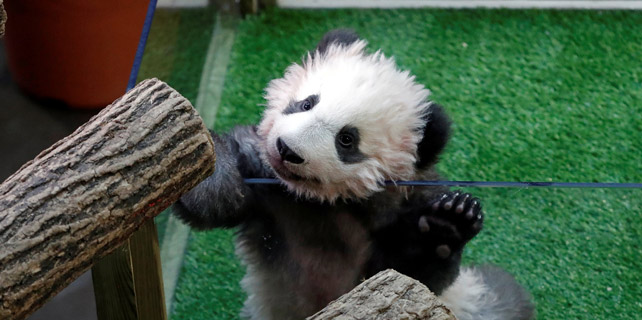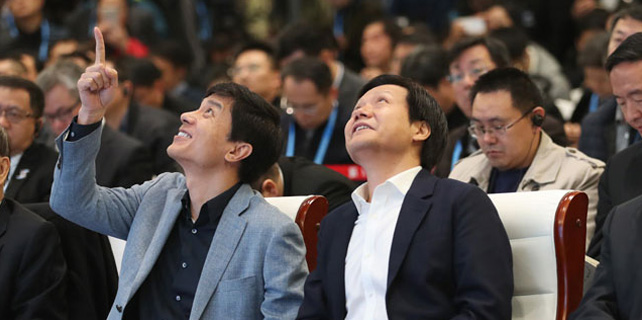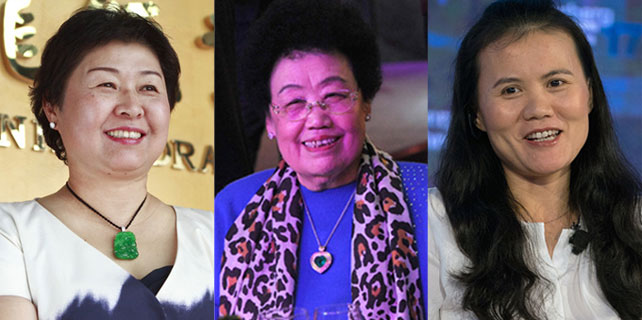Valio winning over Chinese consumers
Finnish dairy manufacturer diversifies into local retail market, offering lactose-free, localized products
First tapping into the Chinese market 32 years ago, Finland's largest dairy company, Valio Ltd, has kept a low profile in the country in recent decades, preferring to team up with leading local players, such as Inner Mongolia Yili Industrial Group Co Ltd.
However, the Finnish giant recently launched a transformation initiative in the country, opening its China headquarters in Shanghai in May to connect with Chinese consumers directly.
|
An employee inspects shelves of melted cheese being cooled in a refrigerator room at the Valio Oy cheese manufacturing plant in Yershovo, Russia, in December 2015. Getty Images |
Established in 1905, Valio is the only dairy company to be related to a Nobel Prize in chemistry. Its then laboratory director Artturi Ilmari Virtanen received the prize in 1945 "for his research and inventions in agricultural and nutrition chemistry". The company's emphasis on research and development, as manifested by its 113-year-old lab, has helped it to release new products to address people's digestive problems, such as lactose intolerance.
To Annikka Susanna Hurme, who has been Valio's CEO since October 2014, the company's lactose-free products could unlock the large potential of the Chinese market, since 80 percent of the population has difficulties absorbing lactose.
Ongoing consumption upgrades in China - which mean consumers are attaching greater importance to green, healthy and traceable food - will provide ample growth opportunities for Valio.
According to global market research company Euromonitor International, the market value of the Chinese dairy industry hit 376 billion yuan ($55.2 billion; 47.3 billion euros; £42.1 billion) last year. It projects the number will top 484 billion yuan in 2022.
In an exclusive interview with China Daily, Hurme talks about her hopes for the Chinese market and her experiences at Valio.
How have your flagship stores on JD and Tmall performed?
We launched our consumer business in China with Tmall and JD last autumn. Last year, for the first time, we took part in China's annual Singles Day online shopping carnival that starts from Nov 11. We launched very successful promotions on these platforms, as the sales revenue during that period was eight times more than the previous month.
Also, we executed a very successful joint promotion with Kellogg's in late October, during the presale period for last year's Singles Day. We created premium breakfast recipes with joint traffic and coupons on JD's e-commerce platform.
Of course, we wanted to sell even more, and it will take years before Chinese consumers really know what Valio is. But the most important thing is we have already had the chance to create a connection between consumers and the Valio brand.

Do you have any specific plans to introduce more products onto these platforms?
First of all, we have to bring the products from Finland to China, and that means we need permission. We have already introduced adult milk powder in the Chinese market, and more is set to come. We are striving to answer the growing demand for trusted high-quality dairy products in China.
Will online platforms be the major distribution channels for you in China?
I think we need both the physical stores and e-commerce platforms. We also have the traditional retailers in China, with about 174 retail stores here so far. But it is still in the beginning stages, and we are mainly focused on premium supermarkets for now.
Do you have any specific targets in terms of sales revenue and when these e-platforms will start to make a profit?
We are in the very early beginning stages still, so it is too early to say when. But luckily, we have already been able to create business here, because we have already been here for 30 years and we have the cash flow from our industry business. So it is a little bit easier to diversify into the retail market and the food sector.
In the past, you took on the role as a supplier to companies like Yili. So what prompted your change from the B2B sector to the B2C sector in China?
In other countries where we operate, we are known as a consumer brand. We have established consumer brands in Finland, Sweden, Estonia, Russia and the United States. It is part of our DNA to be in consumer products. Also, because we are a very innovative dairy company, sometimes it is easier to make some new things for consumers than just on the industrial side.
Have there been any difficulties as you have entered into the B2C sector in China so far?
It is a real challenge, because Chinese consumers are relatively demanding. They know what they want to have.
For the food business, there is also the taste issue. European taste and Chinese taste, sometimes it is totally different. Now we are trying to create something new for the Chinese market and also to innovate to take something new from here to other markets.
Can you give us an example of Chinese consumer tastes that are different from Western ones?
For dairy products, consumers in countries like Sweden and Finland drink a lot of cold milk - fresh cold milk and chilled milk. But Chinese consumers prefer warm milk. So depending on the different temperature of the milk, we have to make some changes to ensure the taste.
Then there is also cheese. In countries like Finland, people eat a lot of cheese and enjoy the natural taste of cheese. But Chinese consumers don't eat so much cheese and prefer those with a strong milky flavor.
There are already a lot of brands, both Chinese and from overseas, in the market. How can you differentiate yours from theirs?
Our lactose-free technology can differentiate our products. We are the first dairy company in the world to create a lactose-free patent, and we can make lactose-free ranges that are as good or even better than the original products.
About 70 to 80 percent of China's population require lactose-free products, and we know how to make good dairy products for the lactose-sensitive stomach.
Do you have a profile for your target Chinese consumer in terms of occupation, income bracket, age, etc?
At the moment it is millennials and moms who want to have the best for their children. If consumers are interested in the Nordic style, it's much easier for them to be interested in us.
How are Chinese consumers taking to the idea of lactose-free products?
It will take time. In a way, we have to educate consumers about what we are talking about when we say it is lactose-free. When we say free, sometimes people think we are taking something away from the milk, so we have to explain that there is a lot of protein and there is nothing wrong, and it is much better for the lactose-sensitive stomach. It is not easy to explain. It has also taken time in Finland, Sweden and the United Kingdom.
As the only dairy company to win a Nobel Prize, please elaborate on your R&D efforts.
We have 15 production sites where we are doing R&D. There is a lot of cooperation between R&D and production. We are also cooperating with universities when we need to achieve some new targets.
At the moment, we have almost 350 patents in 50 countries. In Finland, we have launched almost 1,000 individual products.
Valio is not yet a listed company. Do you have any plans to go public?
No. We are a limited company owned by the dairy farmers. All the shares are owned by the farmers. That is one reason that we have been able to do R&D for so many years. Valio's new innovative products, such as the lactose-free range, took years to develop before we were ready for them to hit the market. It is quite common for a listed company to pursue three-month results, after which the targets will probably change.
You have been at Valio for 20 years. What's the charm of the company to keep you there for so long?
First of all, it is the quality of our products. Also, people have the chance to experience different parts of the business at Valio. If you start in marketing and you want to learn more, you can go to sales. I have been in sales and marketing, and have run our sites and factories.
Then there is the great commitment here. We are owned by Finnish farmers and they are family farmers. We know we are doing business for these people, with faces and names, who want to farm for their whole lives and whose kids will continue in the family business. That is a very strong value.
What are your working philosophies?
Cooperation: People are stronger when they are together. Responsibility: It is about being responsible for the whole chain, including the farmers, animals and nature.
shijing@chinadaily.com.cn
( China Daily European Weekly 08/03/2018 page31)



















